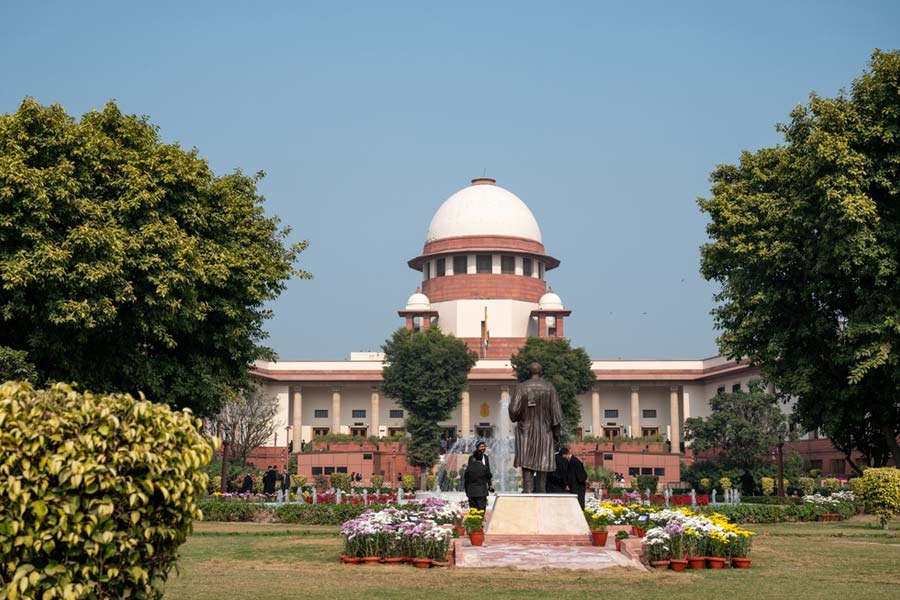The Supreme Court on Tuesday came down heavily on the Assam government for failing to deport illegal foreign nationals and holding them indefinitely at various detention centres, directing the state to start the process of sending them back immediately.
Solicitor-general Tushar Mehta assured the court that the Centre would coordinate with the state to deal with the situation. The BJP is in power in the state.
A bench of Justice Abhay S. Oka and Justice Ujjal Bhuyan expressed displeasure over the failure of the Assam government to clarify its position on deportation, saying the state has “not come clean” on the issue and warned it of perjury proceedings.
“You have refused to start deportation saying their addresses are not known. Why should it be our concern? You deport to their foreign country. Are you waiting for some mahurat (auspicious time)?” Justice Oka, heading the bench, asked the state’s chief secretary who was present in the court virtually.
The bench took exception to the argument of the state’s standing counsel that deportation steps were not taken since the addresses of the foreign migrants were not known.
The court was dealing with applications filed by some foreign migrants seeking better living conditions in the detention centres set up in Assam for declared foreign nationals pending their deportation.
According to the Assam government, 63 foreign nationals are to be deported but it couldn’t be done as their nationality is not known or their addresses in their country of origin are not known.
During the argument on Tuesday, the bench told the chief secretary: “Even without having their address you can deport them. You can’t continue to detain them indefinitely. Once they are held to be foreigners, they should be deported immediately. You know the status of their citizenship. Then how can you wait till their address is received? It is for the other country to decide where they should go.”
The bench also said that the Assam government has not submitted any proposal to the external affairs ministry (MEA) for their deportation.
“Without their address, where do we deport them to?” the state’s counsel asked, to which Justice Oka responded: “You deport them to the capital city of the country to which they belong. Suppose the person is from Pakistan, you know the capital city of Pakistan. How can you keep them detained here saying their foreign address is not known?”
Senior advocate Shadan Farasat, appearing for one of the applicants, told the court that though the state had managed to determine that they are not Indians, they are yet to identify the country to which they belong.
Justice Bhuyan said: “Once you declare a person as a foreigner, then you have to take the next logical step. You can’t detain them forever.”
The court observed that the Assam government had also not mentioned any details about the verification of these foreign nationals to the MEA and the affidavits filed by the state were defective and did not contain any details. “We will issue a perjury notice to you (Assam). As a state government, you are supposed to come clean,” the bench remarked.
At this stage, Mehta entered the court, prompting the bench to tell him: “State of Assam is indulging in suppression of facts.” Mehta tendered his apologies and assured the court that the Centre and the Assam government would work out a joint strategy to address the court’s concerns.
Senior counsel Colin Gonsalves, representing another foreign national, said: “My information is that attempts are being made by the government to figure out if Bangladesh will take these people out. Bangladesh is refusing. India says they are not Indians. Bangladesh says they are not Bangladeshis. They have become stateless. They are in detention for 12-13 years. Bangladesh says they won’t accept anyone who lived in India for many years,” Gonsalves told the bench.
The bench remarked: “On the flip side, the state exchequer is spending on the persons detained for so many years. This concern doesn’t seem to be affecting the government.”
Farasat told the bench that his client was in a detention centre for eight years and was a Bengali from Bengal. He told the court that his client could not be released from the detention centre on bail as even his wife had disowned him and left the matrimonial home. The bench said it would consider such individualissues later.
“Even if addresses of these persons in the foreign country are not available, as the state is aware that they are citizens of a particular country, we direct the state to immediately start the process of deportation in respect of persons at serial number 1 to 63,” the bench said.











